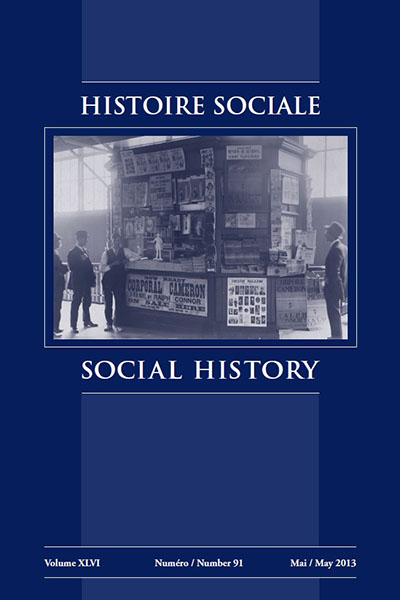Managing Democracy, Defending Capitalism: Gilbert E. Jackson, the Canadian Committee on Industrial Reconstruction, and the Changing Form of Elite Politics in Canada
DOI:
https://doi.org/10.1353/his.2013.0019Abstract
This article examines the interwoven history of University of Toronto economics professor turned-business consultant Gilbert Jackson (1890-1959) and the Canadian Committee on Industrial Reconstruction (CCIR), an organization established by a small group of leading Canadian business executives in 1943. Unknown to the general public of the period, the CCIR financed Jackson to prepare studies and deliver speeches at a time when many corporate leaders believed that the spectre of socialism posed an imminent threat. This secretive political mobilization was intended to shape the formation of “expert opinion” as a means to exercising political influence. A deliberate campaign to manage democracy from above, it altered the political tactics of the business elite by ascribing a greater role and more autonomy to the expert-intellectual. Jackson’s intellectual output and role in the CCIR shared much in common with the contemporaneous activities of early neoliberals in Europe and the United States and presaged the proliferation of advocacy think tanks during the second half of the twentieth century, part of “a new technology of persuasion” that was reshaping the form of elite politics in Canada much earlier than is posited in existing scholarship.
L’article examine l’histoire entrelacée de Gilbert Jackson (1890-1959), professeur d’économie à l’Université de Toronto devenu conseiller en affaires, et du Canadian Committee on Industrial Reconstruction (CCIR), une organisation qu’avaient lancée un petit groupe de dirigeants d’entreprise canadiens en 1943. Ce qu’ignorait alors le grand public, c’est que le CCIR payait Jackson pour faire des études et prononcer des discours à une époque où bon nombre de chefs d’entreprise craignaient le spectre du socialisme, y voyant menace imminente. Cette mobilisation politique secrète visait à mouler « l’opinion des experts » dans le but d’exercer une influence politique. Tentative délibérée de gérer la démocratie d’en haut, cette campagne a transformé la façon pour l’élite des affaires de se mobiliser politiquement en conférant un plus grand rôle et davantage d’autonomie à l’expert-intellectuel. La production intellectuelle et le rôle de Jackson au sein du CCIR avaient beaucoup en commun avec les activités contemporaines des premiers néolibéraux de l’Europe et des États-Unis et laissaient présager la prolifération des cercles de réflexion partisane durant la seconde moitié du XX e siècle dans le cadre d’une « nouvelle technologie de la persuasion » qui remodelait la politique de l’élite au Canada beaucoup plus tôt qu’on ne le postule dans les écrits savants existants.


